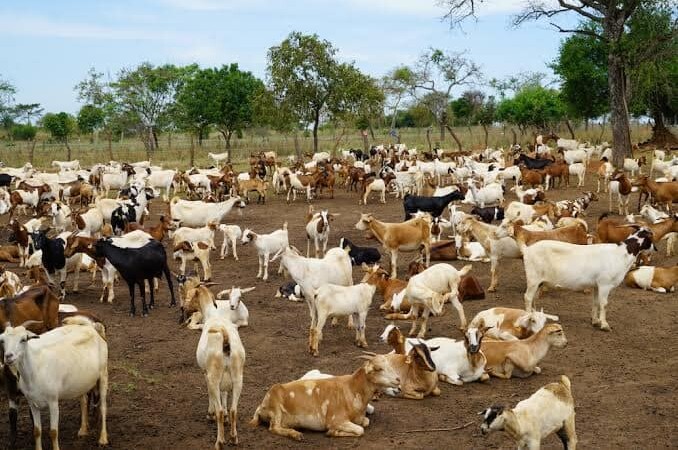

Raising meat goats for meat production in Uganda is a valuable undertaking. The red meat industry remains underutilized in the nation, despite the numerous opportunities available domestically and globally.
Rearing goats for meat production has gained popularity as a lucrative venture. The country offers a favourable environment for goat farming, with abundant natural resources and growing market demand for quality meat. If you are considering venturing into this industry, this comprehensive guide will walk you through the essential aspects of rearing goats for meat production in Uganda, providing you with valuable insights, tips, and best practices to help you succeed.
1. Choosing the Right Goat Breeds:
Selecting suitable goat breeds is crucial for successful meat production. In Uganda, popular meat goat breeds include the Boer, Kalahari Red, and the local East African breeds (Small East African and Galla). These breeds are highly adaptable to various climatic conditions, disease-resistant, and exhibit good growth rates and carcass quality.
The below table highlights some common goat breeds
| Breed | Size | Characteristics | Weight (Adult) |
|---|---|---|---|
| Boer | Large | Fast growth, excellent meat | 90-120 kg |
| Kiko | Medium to Large | Hardy, good foragers | 70-100 kg |
| Kalahari Red | Medium to Large | Adaptability, good meat yield | 60-80 kg |
| Savannah | Medium | Hardy, good meat production | 50-70 kg |
| South African | Medium to Large | High fertility, good meat | 60-80 kg |
| Black Bengal | Small to Medium | Efficient grazers, good meat | 20-30 kg |
| Somali | Small to Medium | Tolerant to arid conditions | 20-30 kg |
| Galla | Small to Medium | Adaptability, good meat quality | 25-40 kg |
| Maradi | Small to Medium | Disease resistance, good meat | 20-30 kg |
| Small East | Small to Medium | Early maturing, good meat | 25-40 kg |
Points to consider in choosing the right goat breed for meat
- Consideration of Breeding Purpose:
Before selecting goat breeds for meat production, it is essential to determine your specific goals and objectives. Are you primarily focused on commercial meat production or breeding for personal consumption? Understanding your purpose will influence the breed characteristics you should look for. - Performance Traits:
Evaluate the performance traits of different goat breeds to ensure they align with your desired outcome. Look for breeds known for their fast growth rate, good feed conversion efficiency, and excellent carcass quality. Consider factors such as the average slaughter weight, dressing percentage, and meat-to-bone ratio. - Adaptability to Local Climate and Conditions:
Kenya’s climate varies from one region to another, so it is crucial to choose goat breeds that can thrive in specific environmental conditions. Consider breeds that are resilient to heat, cold, and diseases prevalent in your area. Indigenous or locally adapted goat breeds are often well-suited to the local climate. - Disease Resistance:
Goats can be susceptible to various diseases, so selecting breeds with inherent disease resistance can save you from potential losses. Research the common diseases in your region and choose breeds known for their resistance to those specific diseases. This will help minimize the risk of health issues and reduce the need for extensive medical interventions. - Market Demand and Preference:
Take into account the market demand and preferences for goat meat in your target area. Certain goat breeds may be more popular and fetch higher prices due to their perceived superior taste or specific cultural preferences. Conduct market research or consult with local meat buyers to gather insights into which breeds are in high demand. - Availability of Breeding Stock:
Consider the availability of breeding stock for the selected goat breeds. It is essential to have a consistent and reliable supply of animals for breeding and expanding your herd. Evaluate the accessibility of reputable breeders or breeding programs that offer quality breeding stock of your chosen goat breed. - Cost and Return on Investment:
Evaluate the costs associated with acquiring and maintaining goats of different breeds. Some high-yielding breeds may also require higher investments in terms of nutrition, healthcare, and management. Calculate the potential return on investment by estimating the market prices and projected growth rates for each breed under consideration. - Consultation with Experts:
Seek advice from experienced goat farmers, veterinarians, or agricultural extension officers who are knowledgeable about the different goat breeds suitable for meat production in your specific region. Their practical insights and expertise can help you make informed decisions based on local conditions and market dynamics.
By carefully considering these aspects and conducting thorough research, you can make an informed decision when choosing the right goat breeds for meat production in Uganda. Remember that selecting the appropriate breeds is a crucial foundation for a successful goat farming venture.
 Contact Jaguza Support
Contact Jaguza Support